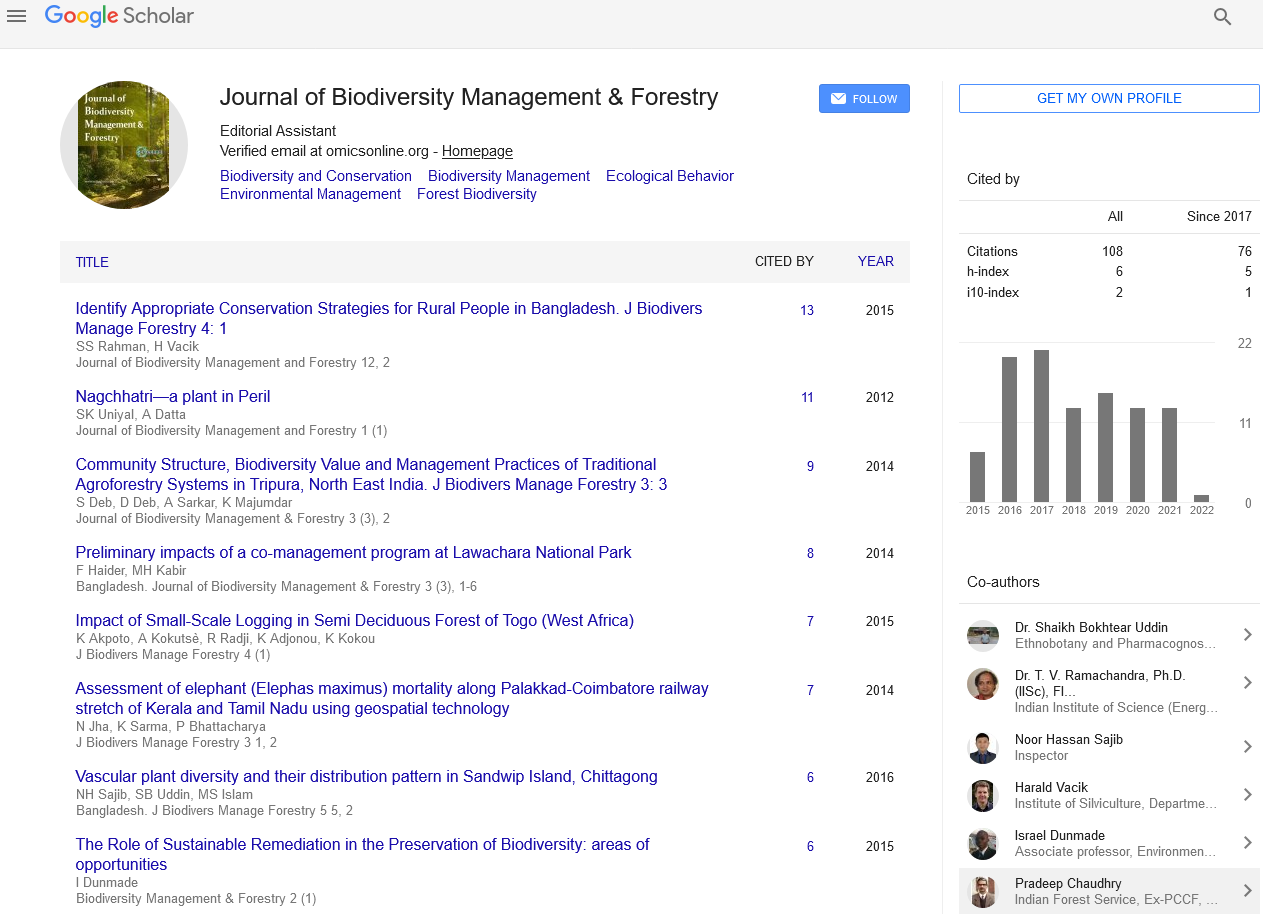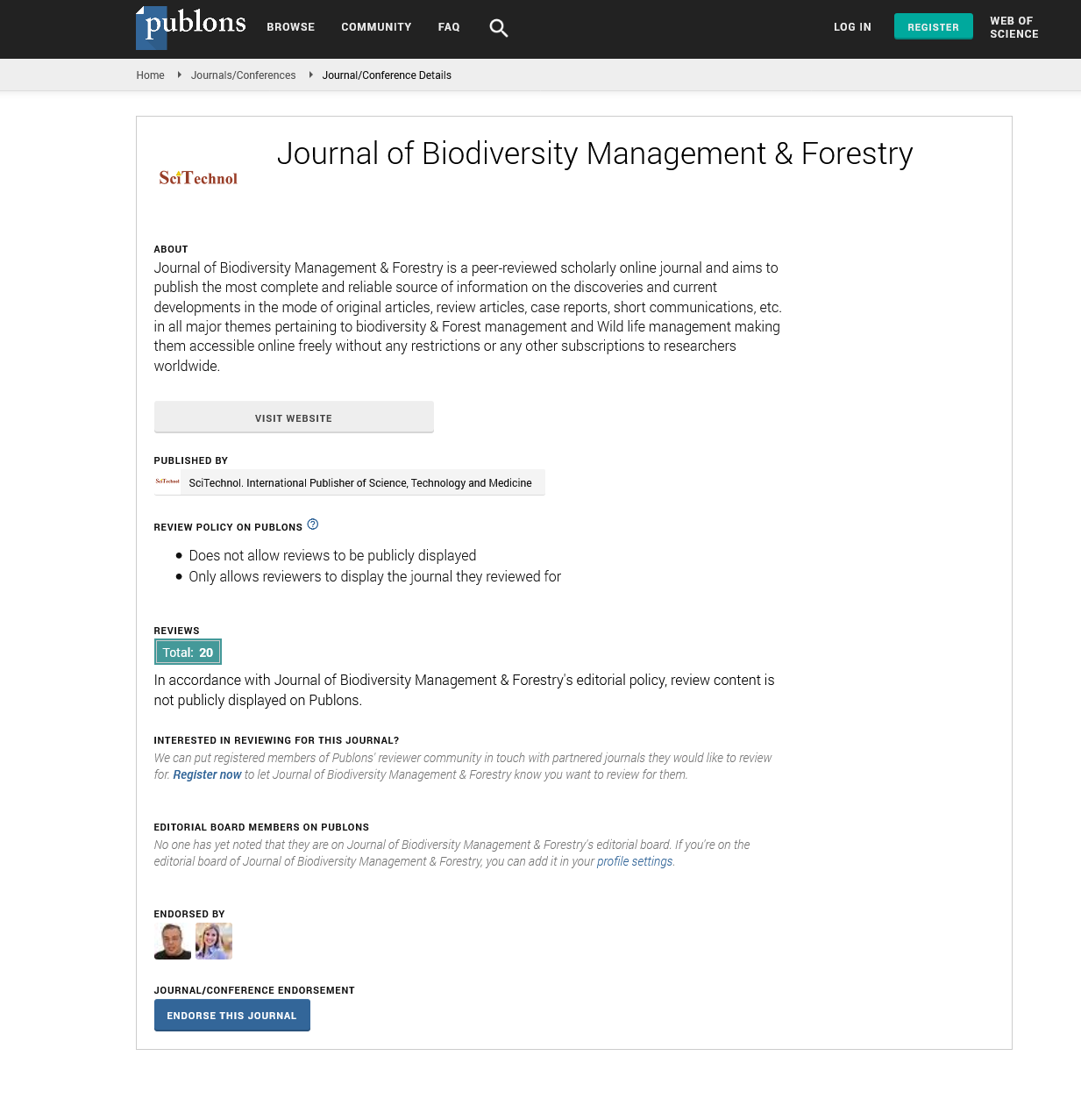Short Communication, J Biodivers Manage Forestry Vol: 12 Issue: 5
Modern Approaches to Forest Management
Juan Eric*
1 Department of Biology and Geology, Pontifical Catholic University of Peru, Lima, Peru
*Corresponding Author: Juan Eric,
Department of Biology and Geology, Pontifical
Catholic University of Peru, Lima, Peru
E-mail: juan.eric@vu.nl
Received date: 28 November, 2023, Manuscript No. JBMF-23-123691;
Editor assigned date: 30 November, 2023, Pre QC No. JBMF-23-123691 (PQ);
Reviewed date: 15 December, 2023, QC No. JBMF-23-123691;
Revised date: 22 December, 2023, Manuscript No. JBMF-23-123691 (R);
Published date: 29 December, 2023, DOI: 10.4172/jbmf 2327-4417.100006
Citation: Eric J (2023) Modern Approaches to Forest Management. J Biodivers Manage Forestry 12:5.
Description
"Modern approaches to forest management reflect a paradigm shift from traditional exploitation toward holistic and sustainable practices. In an era marked by environmental awareness, climate change concerns, and a growing understanding of ecosystems, contemporary forest management embraces a range of innovative strategies. This exploration will delve into the principles, practices, and challenges of modern forest management, highlighting the ways in which it addresses ecological, economic, and social dimensions.
Sustainability is the cornerstone of modern forest management. This principle recognizes the interconnectedness of ecological, economic, and social aspects of forests. Sustainable practices aim to meet the needs of the present without compromising the ability of future generations to meet their own needs. Modern approaches prioritize ecosystem-based management, recognizing forests as complex ecosystems with diverse species interacting in dynamic ways [1]. This perspective involves understanding and preserving ecological processes, maintaining biodiversity, and ensuring the overall health and resilience of forest ecosystems. Departing from a sole focus on timber extraction, modern forest management adopts a multi-use approach [2]. It acknowledges that forests provide a range of ecosystem services, including clean water, carbon sequestration, recreational opportunities, and habitat for biodiversity. Balancing these multiple uses requires careful planning and consideration of various stakeholders [3].
Modern forest management emphasizes the importance of engaging local communities and stakeholders. Recognizing the cultural, economic, and social ties that communities have with forests, modern approaches seek inclusive decision-making processes, respect for traditional knowledge, and collaboration in planning and implementation [4]. The dynamic nature of ecosystems and the uncertainties associated with climate change demand an adaptive management approach. Modern forest management involves continuous monitoring, learning from experiences, and adjusting strategies in response to new information and changing conditions. Certification programs, such as those provided by the Forest Stewardship Council (FSC), set standards for responsible forest management. Modern approaches often seek certification to demonstrate adherence to environmentally and socially sustainable practices, promoting transparency and accountability. Advancements in technology play a crucial role in modern forest management.
Geographic Information System (GIS) mapping, satellite imagery, and remote sensing enable precise monitoring and assessment of forest conditions [5]. This information aids in decision-making processes and enhances the overall efficiency of management practices [6].
Recognizing the impacts of climate change on forest ecosystems, modern forest management incorporates strategies to enhance climate resilience [7]. This may include promoting tree species resilient to changing conditions, implementing measures to mitigate climaterelated risks, and contributing to global climate change mitigation efforts through carbon sequestration [8]. Instead of clear-cutting entire forests, modern approaches often favor selective logging or reduced impact logging. These practices minimize the ecological footprint by targeting specific trees for harvest, preserving the overall structure and function of the forest ecosystem. Agroforestry integrates trees into agricultural landscapes, promoting a symbiotic relationship between forestry and agriculture [9]. This practice enhances biodiversity, improves soil health, and provides additional income streams for local communities through sustainable timber production or non-timber forest products. Recognizing the impacts of past exploitation, modern forest management increasingly incorporates restoration ecology principles. Efforts may include reforestation projects, habitat restoration, and the rehabilitation of degraded areas to enhance biodiversity and ecosystem resilience [10]. Given the increasing frequency and intensity of wildfires, modern forest management includes strategic fire management practices. This involves controlled burns, early detection systems, and community education to reduce the risk of destructive wildfires while maintaining ecosystem health. Invasive species can threaten the balance of forest ecosystems. Modern forest management practices include the identification and control of invasive species to prevent them from outcompeting native vegetation and disrupting ecological processes.
Conclusion
Modern approaches to forest management represent a paradigm shift that acknowledges the interconnectedness of ecological, economic, and social dimensions. The integration of sustainable principles, community engagement, technological advancements, and adaptive strategies defines the contemporary approach to managing forests. As challenges persist, the evolution of modern forest management will continue to be shaped by innovative practices, research-driven insights, and a commitment to safeguarding these invaluable ecosystems for future generations. Balancing the complexities of modern society with the preservation of natural landscapes is the ongoing narrative of modern forest management, an evolving story that seeks harmony between human needs and the wellbeing of the planet.
References
- Horns JJ, Adler FR, Sekercioglu CH (2018) Using opportunistic citizen science data to estimate avian population trends. Biol Conserv 22: 151-159.
- McAlpine C, Lunney D, Melzer A, Menkhorst P, Phillips et al. (2015) Conserving koalas: A review of the contrasting regional trends, outlooks and policy challenges. Biol Conserv 192:226-236.
- Paul K, Quinn MS, Huijser MP, Graham J, Broberg L, et al. (2014) An evaluation of a citizen science data collection program for recording wildlife observations along a highway. J Environ Manage 139: 180-187.
- Rhodes JR, Ng CF, de Villiers DL, Preece HJ, McAlpine CA, et al. (2011) Using integrated population modelling to quantify the implications of multiple threatening processes for a rapidly declining population. Biol Conserv 144: 1081-1088.
- Shumway N, Lunney D, Seabrook L, McAlpine C (2015) Saving our national icon: An ecological analysis of the 2011 Australian Senate inquiry into status of the koala. Environ Sci Policy 54: 297-303.
- William BL (1983) Genetic diversity and genetic vulnerability-an appraisal. Econ Bot 37: 4-12.
- elia HA (2008) Integrating agricultural landscapes with biodiversity conservation in the Mesoamerican hotspot. Conserv Biol 22(1): 8-15.
- Biliana CSC, Belfiore S (2005) Linking marine protected areas to integrate coastal and ocean management: A review of theory and practice. Ocean Coast Manag 48(11-12): 847-868.
- David K, Sutherland WJ (2003) How effective are European agri‐environment schemes in conserving and promoting biodiversity?. J Appl Ecol 40(6): 947-969.
- Sandra D (2006) Biodiversity loss threatens human well-being. PLoS Biol 4(8): e277.
 Spanish
Spanish  Chinese
Chinese  Russian
Russian  German
German  French
French  Japanese
Japanese  Portuguese
Portuguese  Hindi
Hindi 
